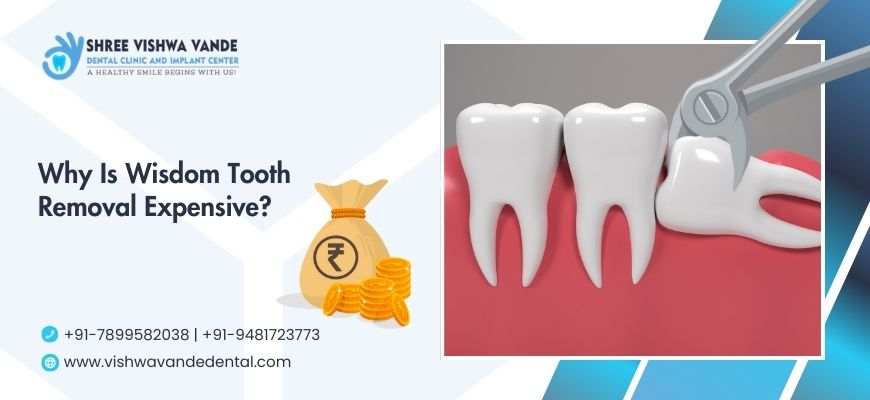Why Is Wisdom Tooth Removal Expensive?

So, your dentist looked at your X-ray, raised an eyebrow, and said it’s time for that wisdom tooth to go. You nodded… until you saw the quote.
Wait, why does wisdom tooth removal cost so much? It’s not like you're buying a house, just getting a tooth out, right?
We get this question a lot, and we’re happy to walk you through it. If you’re in or around Deshpande Nagar, Hubli, and you're wondering about the actual reasons behind the cost of wisdom tooth removal in Hubli, this guide is made for you. We’ll explain everything—clearly, calmly, and with a bit of friendly perspective.
Let’s start at the root of it.
First, What’s the Deal with Wisdom Teeth?
Wisdom teeth, those late bloomers at the back of your mouth, usually show up in your late teens or early 20s. Not everyone needs them removed, but when they:
-
Come in at an odd angle
-
Push into nearby teeth
-
Stay half-buried in the gums
-
Or bring along a party of pain, swelling, or infection
it becomes a necessary step to have them taken out.
But the tricky part is, they’re not like your average teeth. Removing them often requires more than just a “pull.”
So, Why is Wisdom Tooth Removal Pricey?
Now let’s get to the part that matters: why does it cost more than a regular extraction?
1. It’s a Surgical Procedure – Not Just a Tooth Yank
A simple tooth extraction can be done quickly. But wisdom teeth, especially the impacted ones (those stuck in the bone or lying sideways), often need a minor surgery. This involves:
-
A surgical incision
-
Bone removal
-
Sometimes, cutting the tooth into smaller pieces
-
Sutures (stitches)
It's more time, more tools, and more expertise.
2. Location of the Tooth Matters
Upper wisdom teeth tend to be easier to remove. Lower ones? Not so much.
Why?
They often sit closer to major nerves. That’s why dentists take extra care, not just to remove the tooth, but to protect your nerves and jawbone in the process. This means more skill, and often, more time in the chair.
3. X-Rays and Scans Are Needed
Before jumping into any procedure, we usually take a full-mouth X-ray or even a CBCT scan (which gives a 3D image). These help us see:
-
Where the tooth is hiding
-
How close is it to nerves or sinuses
-
Whether bone removal is needed
These diagnostics are key and add to the cost.
4. Sterilization & Safety
We can’t stress this enough: cleanliness in a dental setup isn’t optional, it’s critical. Every surgical procedure requires a sterile environment:
-
Autoclave sterilization of tools
-
PPE for every team member
-
Disposable kits or surgical drapes
These are not one-time costs. They go into every procedure we do.
5. Post-Surgery Materials and Care
Wisdom tooth removal doesn’t end with the extraction. Healing support includes:
-
Medications
-
Cold packs
-
Protective gauze
-
Follow-up visits to check for proper recovery
It’s a complete care cycle, from diagnosis to aftercare.
Wisdom Tooth Removal in Hubli: What Affects the Cost?
If you're from Hubli and comparing prices, here's what typically affects the final quote:
-
Type of impaction (soft tissue, partial bony, full bony)
-
Whether it's a single or multiple tooth extraction
-
Type of anaesthesia (local, with sedation, or general)
-
Need for post-op medication and follow-ups
At Shree Vishwa Vande Dental Clinic, we walk you through each of these factors during your consultation, so you know exactly what you're paying for, no guesswork.
An Example from Our Side
We once treated a college student who had pain but kept delaying the visit, a classic story. By the time she came in, the lower wisdom tooth was pushing her second molar and starting to affect her bite.
It took a full CBCT scan, a minor surgical flap, and about 45 minutes of careful removal. Afterward, she said, “I thought it was just a five-minute thing!”
Nope. And that’s what we mean when we say, you’re not just paying for the removal. You’re paying for doing it the right way.
How to Prepare for Wisdom Tooth Removal?
Here’s a quick checklist:
-
Eat a light meal before the appointment (if you're not getting full sedation).
-
Wear something comfortable.
-
Bring a friend or family member if you're anxious.
-
Stock up on soft foods like curd, khichdi, or smoothies for recovery.
-
Avoid hot, spicy, or crunchy food for a few days post-surgery.
Pro Tip: Don’t plan anything major right after the removal. You’ll want a day or two to relax and heal.
Aftercare: What You Need to Know
Post-surgery care is crucial. Here’s what we usually advise:
-
Bite down on the gauze for 30–45 minutes.
-
Avoid spitting, rinsing, or using straws for the first 24 hours.
-
Apply an ice pack if there’s swelling.
-
Take prescribed meds on time.
-
Come back for a follow-up, especially if you had stitches.
FAQs
1. How much will it cost to remove wisdom teeth?
The cost of wisdom tooth removal depends on several factors, including whether it’s a simple extraction or a surgical one, whether the tooth is impacted, and the type of scans required. Since every case is different, prices can vary quite a bit. The best way to know your cost is to get an evaluation, especially if you're considering wisdom tooth extraction in Hubli or nearby areas.
2. Will I feel a lot of pressure during a wisdom tooth surgical extraction?
Yes, you might feel some pressure, but not pain. During a surgical extraction, the area is numbed with local anaesthesia, so you stay comfortable throughout. That pushing or tugging feeling is normal, and we’ll let you know what to expect so there are no surprises.
3. Does tooth alignment change after wisdom tooth extraction?
Not really. Wisdom tooth extraction usually doesn't affect your existing tooth alignment. In fact, if the wisdom teeth were crowding your back molars, removing them might even give your teeth a little breathing room. But if you're undergoing orthodontic treatment, it’s always good to talk to your dentist about timing.
4. If the wisdom tooth doesn't affect other teeth, should you still extract it?
Not always. If your wisdom tooth is healthy, fully erupted, easy to clean, and not causing any trouble, it can stay right where it is. But if it's hard to reach or likely to cause future problems, it might still be better to remove it before it leads to pain or infection. A proper check-up helps you decide whether wisdom tooth extraction is necessary or not.
5. What should I do after a wisdom tooth extraction to heal properly?
After a wisdom tooth extraction, rest is your best friend, take it easy for at least a day. Stick to soft foods, avoid hot or spicy meals, and skip straws for a couple of days. Keep the area clean, but don’t rinse or spit forcefully for the first 24 hours. And of course, follow any instructions your dentist gives for medication and care, as it helps you heal faster and avoid complications.



